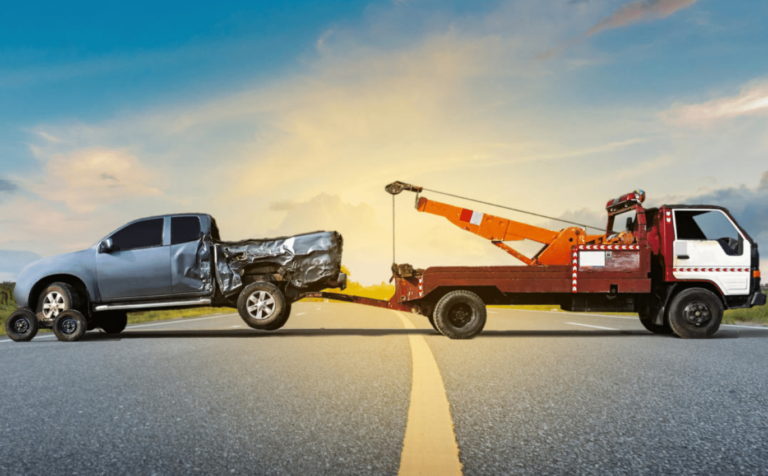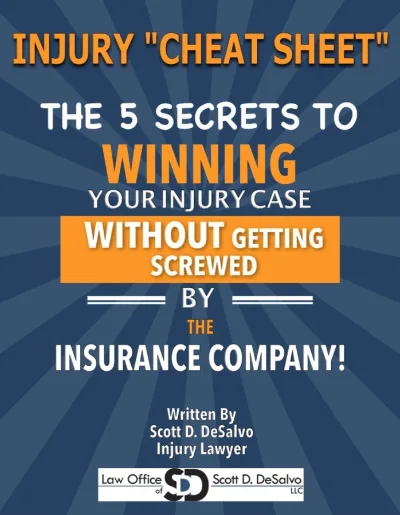
"Car vs truck" can mean that a car and a truck got into a crash. But here, we are mainly talking about the differences between a car crash and a truck crash. Either way, anyone who has gotten into a crash with a truck (or car, for that matter) should take a look to make sure they have the knowledge they need if they or a loved one got hurt in a truck crash.
Are you ready for a lawyer to review your case for free?
If so, give me a call at 312-500-4500.
Or click the button below to submit your case for review, for free.
You know to contact the police and your insurance company, but do you call a lawyer too?
If you’re involved in an accident with a semi, the situation is even more intense and confusing. In this guide, we point out the seven differences between car vs. truck accidents that you need to know.
Since car and truck crashes both involve motor vehicle accidents and the Rules of the Road, they are very similar in many ways. There are some important differences in truck crashes, which I discuss below.
But I thought I should mention that I wrote an 'Ultimate Guide' about car crashes that covers really all motor vehicle accidents. Best of all, it is free and downloadable. I would sincerely suggest you give it a look.

More than 7.2 million car accidents occur in the U.S. every year. The statistics are alarming, considering the data shows the number of crashes is on the rise. The number of fatalities is also increasing.
These figures only tell part of the story. The number of accidents involving large trucks (semis, tractor trailers, etc.) increased by 5% from 2015-2016.
These numbers start to intersect. Large trucks are involved in fewer accidents but cause more damage due to their size. In fact, commercial trucks account for 287,000 insurance property damage claims, more than 77,000 injuries, and more than 4,300 deaths.
It’s obvious that large commercial vehicles cause more damage in a truck and car accident. They weigh 20-30 times more than the average car. They’re also longer and taller.
But there are more differences than the vehicle size when it comes to semi accidents.
You insure your personal car according to your state’s coverage requirements. Your driving record and personal info play a factor in your cost, as does the type of vehicle you drive.
But when you’re talking about an 18-wheeler, it’s a little more complicated.
Semi truck insurance has different liability coverage than cars. This coverage depends on whether they’re an owner-operator or an owner-operator who leases with a carrier.
For the former, policies can run between $3,000-$5,000 per year. For the latter, the average insurance policy costs $9,000-$12,000 every year. Where a trucker falls in these figures also depends on the following:
The way they structure their payment plan also influences the cost, as does their payment history.
These policies are worth millions, which is why the insurance companies spend big bucks fighting claims. They hire the most experienced adjusters to work these cases.
No insurance wants to pay in court, but carriers who hold semi policies use complicated tactics to avoid liability. They also try to blame the injured for the accident.
If a judge or jury finds the truck driver isn’t 100% liable, you could get awarded less money, or your claim could get denied outright. In some cases, the trucker’s insurance company will reach out to you with a settlement offer. Before you accept any amount of money, speak to a lawyer who specializes in these cases.

All passenger vehicles follow state and local traffic ordinances, whereas semis have federal regulations to follow as well. If a tractor-trailer driver is in violation of these laws, 18-wheeler accident settlements look a lot different.
Large and commercial trucks travel the interstate, which forces the federal government to set these regulations. All semi drivers and trucking companies must register with the Federal Motor Carrier Safety Administration (FMCSA) and the Department of Transportation (DOT).
These guidelines regulate how much they can haul and drive in a certain timespan. Truckers and companies must meet special qualifications and inspections.
They must keep accurate logbooks that detail what they haul, where they haul it to, and how long it takes them to get there. If it’s proven they’ve cooked the books, you may be open to higher compensation.
This is another area of expertise your attorney should be confident in.

Personal injury attorneys collect evidence after an accident. They review witness statements, photos of the vehicles, security videos, and police reports.
When it comes to semi accidents, there’s a different set of evidence to collect. These get broken up into one of three categories:
Your lawyer investigates each category so there’s enough information to present your case. When it comes to collecting evidence on the truck driver, your attorney should be looking at the driver’s qualifications and training. They should also review drug and alcohol screenings and the driver’s hours of service documents.
An experienced attorney will also go over evidence related to the semi itself. This includes maintenance and inspection histories. The onboard system and GPS will also get reviewed.
Because cargo plays a crucial role in the weight of the semi, your lawyer should review all weigh station paperwork, bills of lading, and dispatch instructions.
Your attorney will collect evidence faster in a semi-accident. Because the FMCSA only requires truckers to keep records for a set amount of time. For instance, they’re only required to keep logbooks for six months.
You should never rush into hiring an attorney, but in the case of an accident with a semi, bear in mind you’re working with a shorter timeline.
As heavy and large as commercial trucks are, they’re operated in a different manner than passenger cars, making the science of them somewhat unique. The same physics applies, of course, but their size and weight make how trucks move on the road different.
In general, truck drivers need more time to come to a complete stop. It also takes semis longer to speed up than a car. They need more space and special handling to maneuver.
Drivers have to use different angles when backing up and have different blind spots. In an accident, the collision itself is different, beyond the damages and injuries. Equipment failure is more significant in an accident involving a semi.
While equipment failure won’t get the driver off the hook, it could lessen their liability, which decreases your compensation. They’re still responsible for making sure their truck is well-maintained and without equipment issues.
That said, if the equipment failure is the result of a driver failing to maintain or inspect the truck, the onus falls back on them.
If the driver is successful, you and your legal team may have to turn your attention to the trucking company or the truck manufacturer.

That brings us to liability. Proving it in court may be your biggest obstacle. If you are not represented by an attorney, this is where you’ll start losing your case.
Due to all the guidelines truckers and trucking companies follow, they’ll have specialized training in these areas. They will also get trained on the cargo they’re hauling.
Commercial truck drivers should carry a CDL license. There are different classifications for a CDL based on the truck’s size. There are special endorsements on a CDL depending on what type of vehicle it is.
These endorsements mean the CDL holder has training in this field (ex. hazardous material or charter bus driving). In an accident, one of the first things a lawyer does is verify that the driver holds the correct licenses and certifications.
For example, if the driver doesn’t have a T endorsement but was operating a double-trailer that hit you, they weren’t qualified for that load, and the trucking company may be liable.
Even in extreme situations, like terrible car accidents that result in death, you’re only dealing with the other driver and their insurance company. In a crash involving a tractor-trailer, you have many parties involved.
Depending on who the driver is and where he/she work, the owner of the trucking company could also be liable. Under FMCSR guidelines, the truck (tractor) and trailer are separate entities. As such, the truck and trailer aren’t always owned by the same company.
Sometimes, the owner of the haul or trailer could be at fault. Most often, drivers don’t load the trailers. Shippers or loaders handle the cargo, including loading and offloading it from the trailer.
If the cargo is at fault, freight forwarders, warehouse workers, brokers, and shippers are open to liability. Maintenance and repair shops can also be liable if their faulty or improper work it to blame.

A large part of the compensation involves the injuries you suffered and how much they cost you. Because a semi causes more damage than a passenger car, it stands to reason that the medical bills are higher.
This is a bit of a no-brainer, but because the medical bills are higher, the compensation amount you’re seeking will be higher. Depending on your case, you may get awarded property damages.
If you miss work for an extended period of time or lose your job as a result of the accident, you may receive compensation for the loss of income. An experienced personal injury attorney will know how to calculate all your damages and financial losses to get you the most compensation possible.

In the same way, car vs. truck accidents cause different results than a car vs. car accident, different states have different laws regarding these accidents.
Here in Illinois, the Rules of the Road can be tricky. Chicago has its own ordinances regarding trucks, cars, motorcycles, and bicycles, so you need a lawyer who understands these differences inside and out.
If you’re ever involved in a car accident involving a large truck, contact The Law Office of Scott D. DeSalvo. Our testimonials prove you can like and trust your lawyer.
You can get a free consultation by calling us today.
Visit our Mission page to learn more about Mr. DeSalvo’s ethical philosophy when it comes to practicing law.
Or click the button below to submit your case. It's confidential and free.
Find out if you have a good case, or a tough one...for free!
Would you like to know more about car accident vs truck accident differences? Click here!
If you or a loved one is dealing with a situation like this, give us a call any time, day or night. We are here to help. 312-500-4500


Scott DeSalvo founded DeSalvo Law to help injured people throughout Chicago and surrounding suburbs. Licensed to practice law in Illinois since 1998, IARDC #6244452, Scott has represented over 3,000 clients in personal injury, workers compensation, and accident cases.
No Fee Unless You Win | Free Consultation | 24/7 Availability Call or Text: (312) 500-4500
>>Read More
Main Office:
1000 Jorie Blvd Ste 204
Oak Brook, IL 60523
New Cases: 312-500-4500
Office: 312-895-0545
Fax: 866-629-1817
service@desalvolaw.com
Chicago and Other Suburban Offices
By Appointment Only